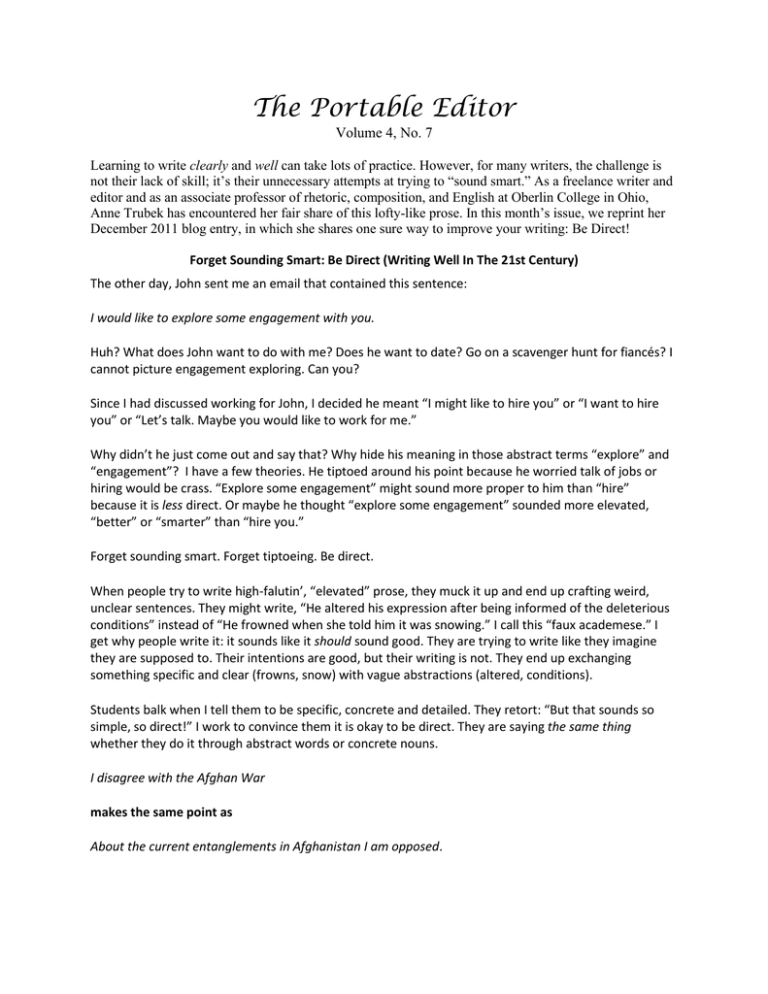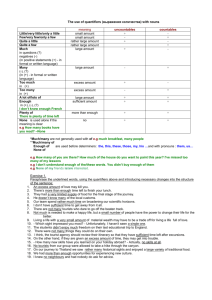The Portable Editor Volume 4, No. 7
advertisement

The Portable Editor Volume 4, No. 7 Learning to write clearly and well can take lots of practice. However, for many writers, the challenge is not their lack of skill; it’s their unnecessary attempts at trying to “sound smart.” As a freelance writer and editor and as an associate professor of rhetoric, composition, and English at Oberlin College in Ohio, Anne Trubek has encountered her fair share of this lofty-like prose. In this month’s issue, we reprint her December 2011 blog entry, in which she shares one sure way to improve your writing: Be Direct! Forget Sounding Smart: Be Direct (Writing Well In The 21st Century) The other day, John sent me an email that contained this sentence: I would like to explore some engagement with you. Huh? What does John want to do with me? Does he want to date? Go on a scavenger hunt for fiancés? I cannot picture engagement exploring. Can you? Since I had discussed working for John, I decided he meant “I might like to hire you” or “I want to hire you” or “Let’s talk. Maybe you would like to work for me.” Why didn’t he just come out and say that? Why hide his meaning in those abstract terms “explore” and “engagement”? I have a few theories. He tiptoed around his point because he worried talk of jobs or hiring would be crass. “Explore some engagement” might sound more proper to him than “hire” because it is less direct. Or maybe he thought “explore some engagement” sounded more elevated, “better” or “smarter” than “hire you.” Forget sounding smart. Forget tiptoeing. Be direct. When people try to write high-falutin’, “elevated” prose, they muck it up and end up crafting weird, unclear sentences. They might write, “He altered his expression after being informed of the deleterious conditions” instead of “He frowned when she told him it was snowing.” I call this “faux academese.” I get why people write it: it sounds like it should sound good. They are trying to write like they imagine they are supposed to. Their intentions are good, but their writing is not. They end up exchanging something specific and clear (frowns, snow) with vague abstractions (altered, conditions). Students balk when I tell them to be specific, concrete and detailed. They retort: “But that sounds so simple, so direct!” I work to convince them it is okay to be direct. They are saying the same thing whether they do it through abstract words or concrete nouns. I disagree with the Afghan War makes the same point as About the current entanglements in Afghanistan I am opposed. Some students think that the second sentence is preferable because it is longer, uses fancier words and sounds complicated. They are wrong. By trying to “sound smart” or “be less direct” they write murky, fuzzy prose. Both sentences say the same thing. When I convince students that convoluted, vague prose hurts their papers, they relax. They stop “translating” clear ideas in their head into vague concepts. Their ideas sharpen; their writing improves. In many cases, writing more like they speak helps them write better. Practice writing by focusing on the subjects and verbs of sentences. Begin your sentence with a concrete subject. Ask yourself: Who is doing something in the sentence? Example: The affordability of hotels is one major factor that draws tourists to Baja. The subject is “affordability of hotels.” But affordability is a poor subject because it is abstract and hard to picture. How about making the tourists the subject? Revision: Tourists… Follow the subject with a verb. Ask yourself: What are the people doing? What are the tourists doing? Going to Baja, right? What verb better expresses “going to”? How about “visit”? Revision: Tourists visit…. Now we are left with “affordability of hotels.” How else could we put this? Could we make it more direct? How about “cheap hotels”? Revision: Many tourists visit Baja because of its cheap hotels. Here’s another example: The instinctual response of a child who is accused of something is to deny responsibility. Who is the best subject? Children! (“Instinctual responses” are very hard to imagine.) What are they doing? Denying! (“Is accused” is passive; make your verbs active.) Revision: Children instinctively deny responsibility when they are accused of something. (Posted with permission from Anne Trubek: http://annetrubek.com/ ) Trubek’s blog ends on an optimistic note about writing in the 21st century. We hope that writers will follow her advice, abandoning inflated words and becoming confident and comfortable with simple, direct writing. Need Writing Help? Contact the Writing Support Team via email: soswwritingsupport@gmail.com





